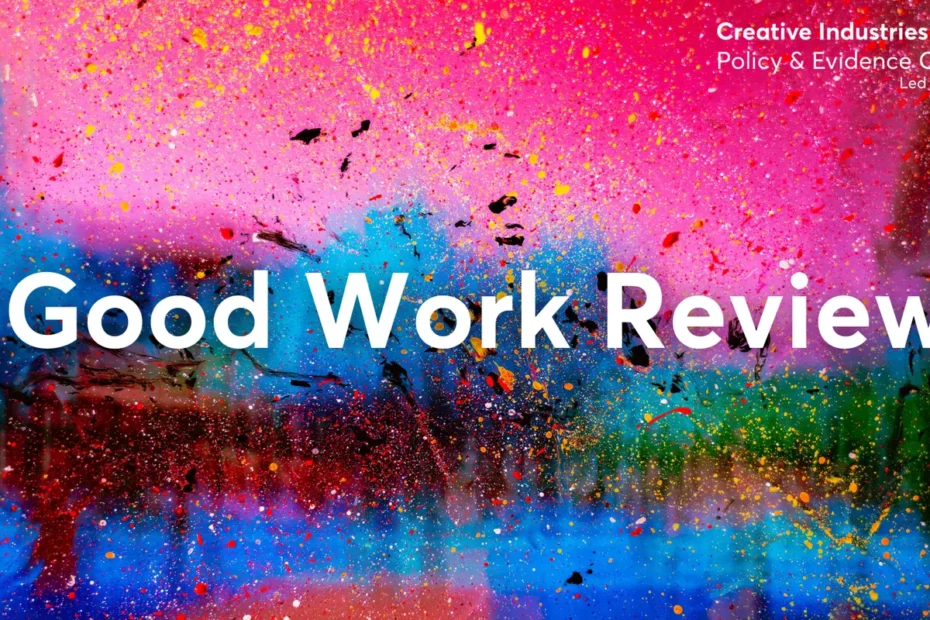Published today: 23rd February 2023
The Creative Industries – from fashion and film to video games and visual arts – are a UK success story. The sector grew at double the rate of the UK economy as a whole between 2011 and 2019, with 400,000 additional jobs created since 2015. A new review, published today – the first to look at the industry as a whole – looks at whether these are ‘good quality’ jobs. There is found to be higher job satisfaction amongst creative industry workers than for the economy as a whole. However, the Good Work Review also points to ways in which investment in the workforce could strengthen the sector, ensuring the UK remains a creative leader. The report is published by the AHRC-funded Creative Industries Policy & Evidence Centre.
Creative sector work is found to have many positives: it provides opportunity for creative expression, greater autonomy and more flexible working. However, pay in some parts of the creative workforce is low, hours long and workplace culture could be improved through targeted action to support workers’ well-being and the diversity of the sector.
The Good Work Review: Job Quality in the Creative Industries finds only 8% of employers in the creative sector have formal procedures in place for employee consultation (almost half the all-industry average) and only a third of creative industry employers have training plans in place.
Job quality for creative freelancers is found to be of particular concern. Freelancing, when it’s an active choice, can bring greater autonomy and flexibility, yet it is also found to bring financial insecurity, and limited ability to influence decisions that impact their working lives. Creative freelancers can lack the time or money to invest in skills, with just 1 in 10 self-employed creative industry workers participating in training (compared to 25% on average across the UK workforce). In an industry dependent on the skills and talent of an often freelance workforce this is a concern.
The Review also finds that the lack of representation of diverse talent is more pronounced in the creative industries than in many other parts of the UK economy, and that job quality varies considerably depending on age, ethnicity, disability and class.
The year-long, four UK-nation review of job quality in the creative industries, includes evidence from 120 creative industry sector organisations. Across 40 indicators of what makes work ‘good’ – including fair pay, flexible working, paid overtime and employee representation – the review finds that no creative sub-sector is thriving in all areas. The report offers 16 recommendations for industry, Government and wider stakeholders to advance Good Work for all Creative workers. It calls for industry-leadership, working with UK and devolved Government to develop national action plans, tailored to local economic needs and customised to priorities in the different creative industry sub-sectors.
Creative Industries Minister Julia Lopez says: “Our creative industries are booming, with jobs in sectors such as film, fashion, music and video games growing at five times the rate of the rest of the economy. This first-of-its-kind review raises important issues facing the industry along with recommendations to ensure creative work is good work. We will be working with colleagues across government and industry to address the proposals in our forthcoming Creative Industries Sector Vision.”
Heather Carey, Co-Director of Work Advance, who led the research, says: “The ‘Good Work Review’ represents a huge opportunity for government and industry to back the creative industry workforce, and act as a trailblazer by advancing strategies to improve job quality in the creative industries in each of the four UK nations. There is growing evidence of the productivity and performance benefits associated with good management and workplace practices. We’ve set out 16 recommendations which, if adopted, will bolster the sector for a generation”.
Recommendations cover four areas; creative workforce protection, improvement in management practices, better access to skills training and professional development and improved worker representation and voice. The review also calls for Industry to urgently address persistent and pronounced disparities in access and the quality of work for those from underrepresented backgrounds and for more protection, support and training opportunities for creative freelancers. Workers in the creative industries are twice as likely to be self-employed than is average across the economy (26% compared to 13%).
Sir Peter Bazalgette, Industry co-Chair of the Creative Industries Council, says: “Growing a skilled, diverse and motivated workforce is a key priority for our creative industries, which are set to create many more jobs over the next few years. We welcome this report and look forward to working with Government in taking forward this important agenda.”
Hasan Bakhshi, Director, Creative Industries Policy & Evidence Centre says: “All the research shows that creative skills are becoming even more important in the workforce as AI and other technological advantages make more routine work more automated. Creative jobs will therefore grow, and with them the UK’s innovativeness and productivity. Our Good Work Review shows that nothing short of system-wide changes are needed however to ensure that these economic benefits are felt by all parts of the creative workforce.”
Dawn Bowden, Deputy Minister for Arts and Sport, Welsh Government says: “We welcome this report and the opportunity we had to engage with the PEC’s review together with representatives from the creative sector and trade unions in Wales. We are proud of the success of our creative industries – they are key to our economy and showcase Wales to the world. At the heart of this success is an incredibly talented, committed and skilled workforce and we are committed to using the levers we have to improve their experience of work.”
Colum Boyle, Permanent Secretary, Department for Communities, Northern Ireland Executive, says: “As the Creative sectors here continue to grow this review could not be more timely. It is important that we focus on building a strong, sustainable creative sector, one which not only benefits our local community and wider society but one that encourages the development of skills and offers fair and equitable employment for all. The recommendations contained within this report offer important learning and reflection for stakeholders across the creative sector “
Neil Gray, Culture Minister, Scottish Government, says: “The Scottish Government is working hard to build fairer and more inclusive workplaces across the culture and heritage sector. We would like to thank Creative PEC for listening to Scotland’s creative voices during the course of the review. As we advance towards our goal to become a leading Fair Work nation by 2025 we look forward to examining this important evidence base.”
Clive Gillman, Director of Creative Industries at Creative Scotland, says: “The creative industries are an important, future-facing part of our society, contributing cultural, social and economic value.
But we know there are many issues regarding how people work within the sector. The Good Work Review will sit alongside other work we have commissioned as a vital piece of research that provides the UK-wide analysis that will help us to better understand how to support the sector to grow and develop in ways that are positive and progressive. We look forward to working with the recommendations of the Review and to see how this complex sector can evolve to be stronger and more inclusive in the future.”
The Good Work Review: Job Quality in the Creative Industries was written by Heather Carey and Lesley Giles (Work Advance) and Dave O’Brien (University of Sheffield) for the Arts and Humanities Research Council (AHRC)-funded Creative Industries Policy and Evidence Centre (Creative PEC). The review was co-funded by the Department for Digital, Culture, Media and Sport.
/ENDS
Press contact
The report authors are available for interview.
The report can be downloaded at: https://pec.ac.uk/research-reports/good-work-review
Press contact: Alice Kent: alice.kent@nesta.org.uk and Anna Zabow: anna.zabow@nesta.org.uk
Notes to Editors
1. The Good Work Review: Job Quality in the Creative Industries 2023 {ADD LINK} was written by Heather Carey and Lesley Giles (Work Advance) and Dave O’Brien (University of Sheffield), for the Arts and Humanities Research Council funded Creative Industries Policy and Evidence Centre. The review was co-funded by the Department for Digital, Culture, Media and Sport.
2. Developing a Good Work Strategy for the Creative Industries to advance a long-term plan to ensure the creative sector offers Good Work to those from all backgrounds was one of the key recommendations in the PEC’s research report: Social mobility in the creative economy: Rebuilding and levelling up? Written by Heather Carey, Dr Dave O’Brien, Dr Olivia Gable (September 2021 )
3. About the Creative Industries Policy and Evidence Centre (Creative PEC)
The Creative Industries Policy and Evidence Centre (Creative PEC) works to support the growth of the UK’s Creative Industries through the production of independent and authoritative evidence and policy advice. Led by Nesta and funded by the Arts and Humanities Research Council as part of the UK Government’s Industrial Strategy, the Centre comprises of a consortium of universities and one joint enterprise from across the UK (Birmingham; Cardiff; Edinburgh; Glasgow; LSE; Manchester; Newcastle; Sussex; Ulster and Work Advance). The Creative PEC works with a diverse range of industry partners including Creative UK. To find out more, visit www.pec.ac.uk and @CreativePEC
4. About Work Advance
Work Advance provides independent research, evaluation and advisory services, working collaboratively to secure practical improvements and bring lasting positive change to the world of work: supporting a more competitive and inclusive future for the UK. https://workadvance.co.uk/
5. The Creative Industries Policy and Evidence Centre (Creative PEC) is part of the Creative Industries Clusters Programme, which is funded by the Industrial Strategy Challenge Fund and delivered by the
Related News and Press
Bolster business and financial support for creative industries micro firms to achieve UK innovation and growth ambitions
New Creative PEC research suggests creative industries micro firms have a vital role to play in driv…
Back the creative industries to grow the economy, says new research showing creative firms are more likely to be innovators and exporters
New research finds a higher share of UK creative MSMEs are exporters compared with the rest of the e…


